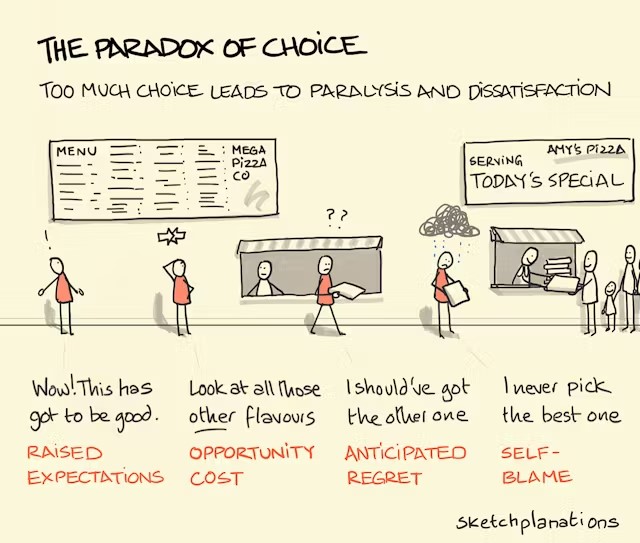Paradox:
a statement or situation that may be true but seems impossible or difficult to understand because it contains two opposite facts or characteristics
Paradox of Choice:
Based on, and quoted from:
In the modern world, more and more options are becoming easily available to us. The paradox of choice stipulates that while we might believe that being presented with multiple options actually makes it easier to choose one that we are happy with, and thus increases consumer satisfaction, having an abundance of options actually requires more effort to make a decision and can leave us feeling unsatisfied with our choice.
An example provided by the Decision Lab at:
Imagine that you need milk, so you go to the grocery store to pick some up. When you get to the dairy aisle you see that there are dozens of options. These days, not only do you have to make a decision on the percentage of fat you want (1%, 2%, skim, etc.), but also what source you want your milk to be coming from: cows, almonds, soybeans, oats…the list goes on. Almost dumbfounded, you stand in front of the aisle and have no idea what milk to pick. There are so many choices that you are overwhelmed.
The paradox of choice was popularized by American psychologist Barry Schwartz when he published his book, The Paradox of Choice: Why More is Less, in 2004.
Learning to choose is hard. Learning to choose well is harder. And learning to choose well in a world of unlimited possibilities is harder still, perhaps too hard.
– Barry Schwartz in his book The Paradox of Choice
Businesses and corporations often also follow this ideology, believing that more choices will lead to greater customer utility. However, Schwartz found that having this unparalleled plethora of choice in the modern world was actually causing people to be less happy with their decisions. He found that instead of increasing decision satisfaction, having too many options made people less likely to be satisfied that they had made the best decision. While freedom is important, Schwartz explains that there is a fine line between having the freedom to choose what you want and being paralyzed in the face of too many options.
While it is easy to choose option A if there is only an option B, it becomes much harder to gauge the value and utility of A when there are options A-Z. As a result, we encounter a choice overload and become more dissatisfied with the choice that we eventually make.
Social media has also changed the way that we choose a life partner. Dating apps like Tinder and Hinge have enabled people to have dozens of options of who to date at their fingertips.




No comments:
Post a Comment
Note: Only a member of this blog may post a comment.